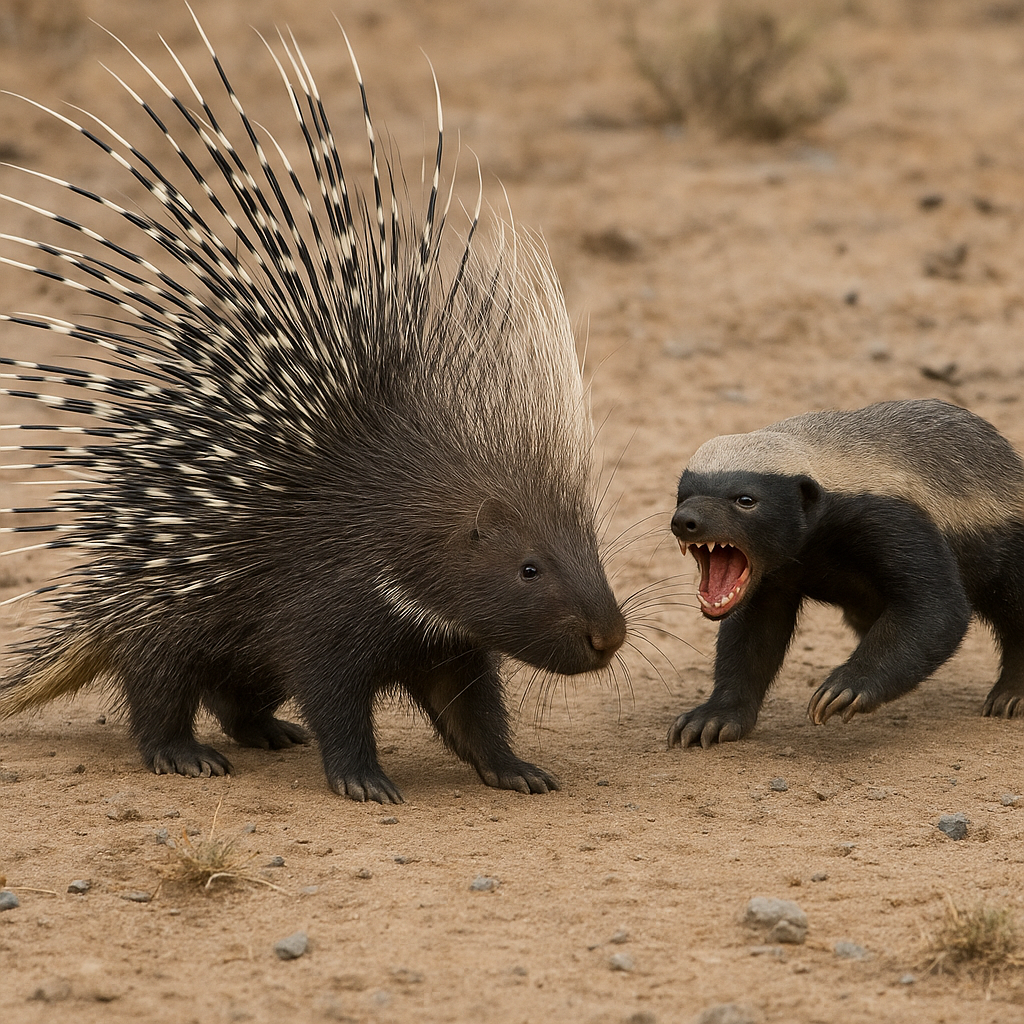In the animal kingdom, few face-offs are as intriguing as the clash between a porcupine and a honey badger. These two animals, both renowned for their unique defense strategies and tenacity, seem like unlikely opponents. Yet, in the wild, their paths can cross, setting the stage for a fascinating showdown. Who wins when a porcupine faces a honey badger? The answer is more complex than you might expect.
Add Impressive Nature New Tab theme for Google Chrome and enjoy awe-inspiring beauty of animals, flowers, and nature landscapes every time you open a new tab.
Meet the Contenders
Porcupine: Nature’s Walking Armor
Porcupines are herbivorous rodents known for their sharp quills, which can number over 30,000. Contrary to myth, porcupines can’t shoot their quills, but they detach easily when touched. Each quill is barbed, making it difficult and painful to remove once embedded. The primary defense strategy of a porcupine is to present its back and tail to a predator, warning with rattling quills and then striking if needed.

Interesting Facts:
- Porcupines are mostly nocturnal.
- Their quills regrow if lost.
- North American and African porcupines differ; the latter are more aggressive and social.
Honey Badger: Fearless Predator of the Savanna
The honey badger, or ratel, is a carnivorous mammal known for its fearlessness and powerful bite. It has thick, loose skin and a muscular build that allows it to twist and retaliate even when caught. Its boldness makes it a predator of snakes, scorpions, and even young antelope. Honey badgers have been observed attacking beehives, porcupines, and larger prey despite their size.

Interesting Facts:
- Honey badgers have been filmed chasing off lions.
- Their skin is resistant to bee stings and snake venom.
- They are highly intelligent and known for using tools.
The Matchup: Porcupine vs. Honey Badger
Defense vs. Offense
The porcupine relies on a purely defensive strategy. It avoids conflict and will only strike if directly threatened. Its quills can cause serious injury or death if a predator isn’t cautious. On the other hand, the honey badger thrives on confrontation. With a high pain threshold and insatiable curiosity, it’s more likely to engage a porcupine than back down.
Real-Life Encounters
In documented cases, honey badgers have been known to kill and eat porcupines. However, this outcome is not guaranteed. The porcupine’s quills can pierce vital areas, including the throat and face, deterring even the most persistent attacker. A wounded honey badger might retreat or die from infection if quills are embedded too deeply.

Tactics and Strategy
- Porcupine: Turns back, displays quills, and lashes out with tail.
- Honey Badger: Attempts to flip the porcupine onto its back to expose the unprotected belly.
Victory often depends on the element of surprise and the condition of each animal. A seasoned honey badger might know how to exploit the porcupine’s weak points. A vigilant porcupine, however, can outlast or even fatally injure its attacker.
Survival Adaptations
Porcupine Adaptations:
- Barbed quills for defense.
- Strong scent glands to deter predators.
- Tree-climbing ability to escape ground predators.
Honey Badger Adaptations:
- Loose, thick skin protects from bites and stings.
- Powerful jaws and claws.
- High resistance to venom and pain.
Ecological Importance
Porcupines help control vegetation and create habitats for other animals by gnawing on trees. Honey badgers regulate populations of venomous creatures and spread seeds when raiding beehives. Both play critical roles in their ecosystems.
Who Wins When a Porcupine Faces a Honey Badger?
Ultimately, there is no clear winner every time. Each encounter is unique. If the honey badger is experienced, it may succeed in flipping and killing the porcupine. But many honey badgers suffer injuries or retreat, unable to penetrate the spiky defense. Nature doesn’t always crown a champion—it rewards survival.
Final Verdict: A Draw of Strategy and Grit
When pondering who wins when a porcupine faces a honey badger, the answer lies in the circumstances. It’s a clash of cunning and caution versus audacity and aggression. These two animals embody the extreme ends of survival tactics: passive defense and fearless offense.
Key Takeaways:
- Porcupines rely on quills; honey badgers rely on bold attacks.
- Victories go both ways, depending on strategy and experience.
- Each species is highly adapted for survival in its own right.











